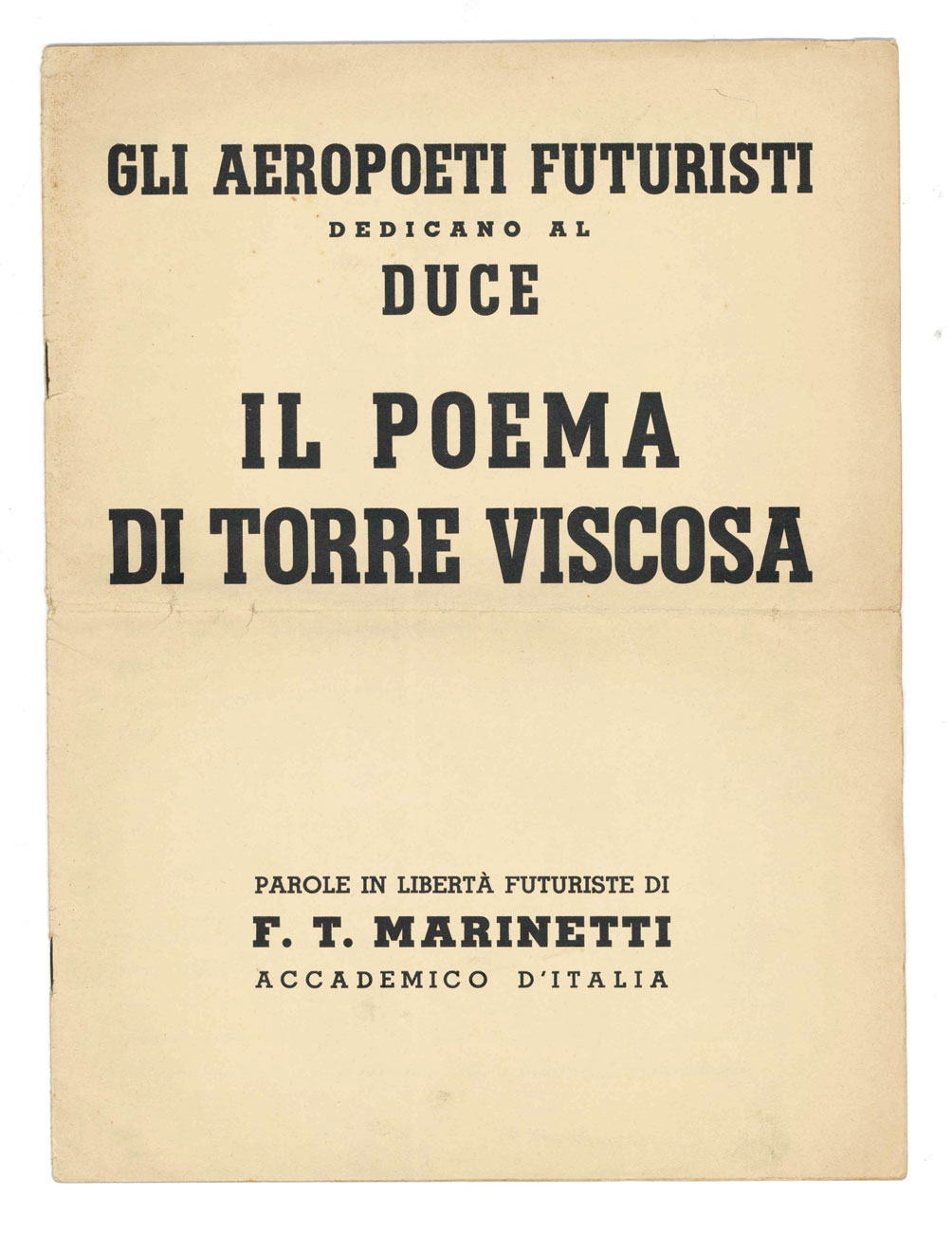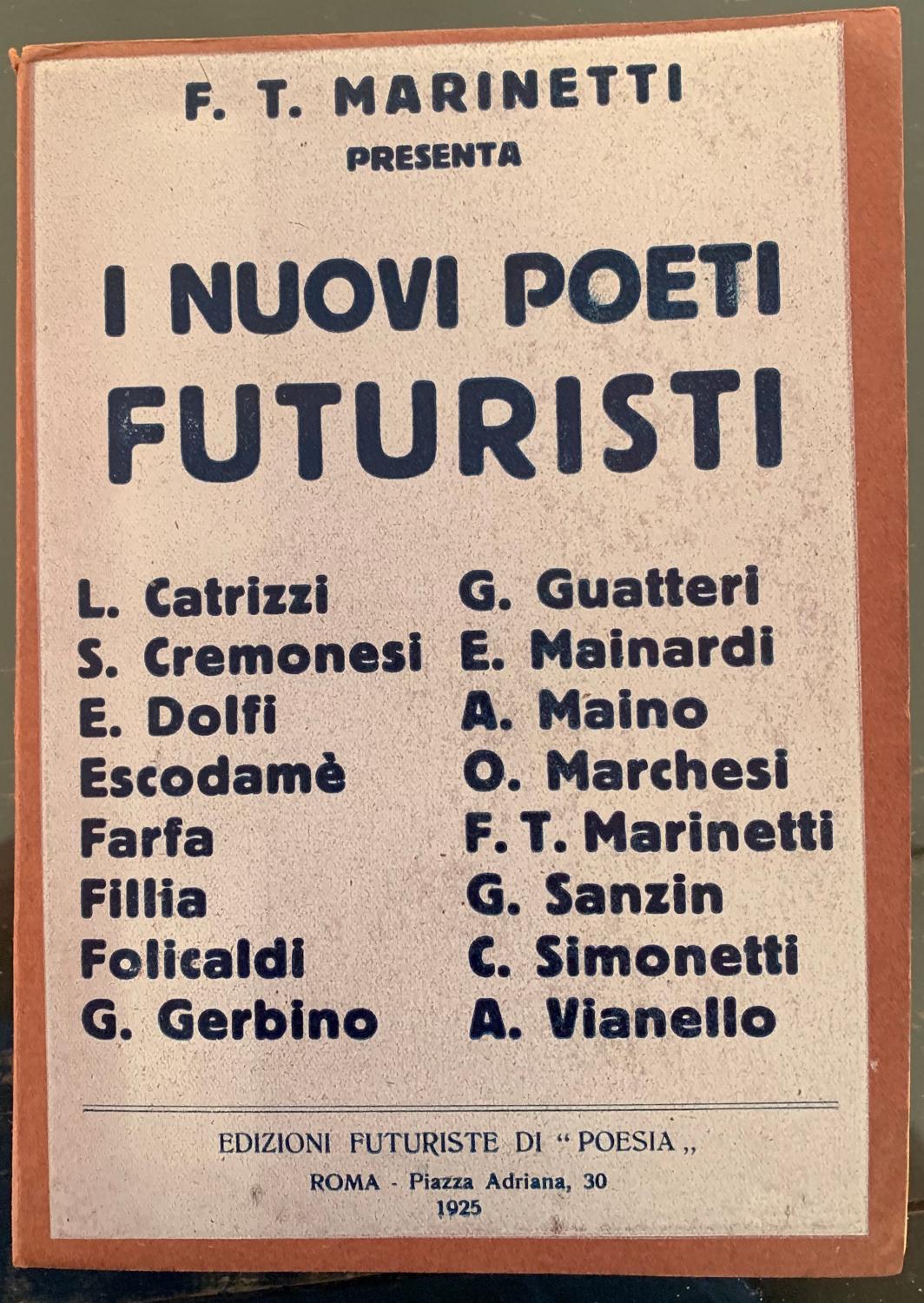
Filippo Tommaso Poemas Futuristas Cortos
Filippo Tommaso Marinetti (born December 22, 1876, Alexandria, Egypt—died December 2, 1944, Bellagio, Italy) was an Italian-French prose writer, novelist, poet, and dramatist. He was the ideological founder of Futurism, an early 20th-century literary, artistic, and political movement. Marinetti was educated in Egypt, France, Italy, and.

Associazione Culturale ITALIA Storica Il poema africano della Divisione "28 Ottobre" di Filippo
Analysis (ai): This poem by Filippo Tommaso Marinetti, a pioneer of Futurism, exhibits the movement's signature style of "parole in liberte" (words in freedom). The poem is a collage-like composition, with dissonant elements arranged freely on the page. The text is distorted and fragmented, resulting in a chaotic pattern that reflects the chaos.

Filippo Tommaso Distruzione. Poema futurista. 1911. Libreria di Frusaglia
Filippo Tommaso Marinetti Poems. 1. The Joy Of Mechanical Force. We have been up all night, my friends and I, beneath mosque lamps whose copper domes, as open-worked as our souls, yet had electric hearts. And while we trod our native sloth into opulent Persian carpets, we carried our.

Gli aeropoeti futuristi dedicano al Duce il poema di Torre Viscosa. Parole in libertà futuriste
F.T. Marinetti, Il poema dei Sansepolcristi, 1939 Bookreader Item Preview. Marinetti, Filippo Tommaso. Publication date 1939 Usage Attribution-NonCommercial-NoDerivs 3.0 Italy Topics Archivio del '900, futurism, fondo librario Archivio di Nuova Scrittura, poesia, Mart futurismo, poetry

Filippo Tommaso Distruzione. Poema futurista. 1911. Libreria di Frusaglia
F. T. Marinetti (1876-1944) is widely known as the founder of Futurism, an early twentieth-century cultural revolution that began as a literary movement and expanded to influence painters, musicians, dramatists, architects, and graphic artists throughout the world. This volume, a translation of more than forty poems and prose works by Marinetti, presents premier examples of his rich poetic.

I nuovi Poeti Futuristi by Filippo Tommaso Muy bien Encuadernación de tapa blanda
Análisis del poema "Abrazarte" Ariadna Diaz Chavez Ximena Ramïrez Ibarra El poema que se selecciono es "Abrazarte" de Filippo Tomasso del genero de futurismo, se selecciono este tema porque es un genero que puede generar interés a las personas y lectores. El poema presenta una En

Análisis del Poema Futurista "Abrazarte", de Filippo Tomasso
y tus recios pneumáticos se hinchen para las danzas. que bailen por las blancas carreteras del mundo. Suelto, por fin, tus bridas metálicas.., ¡Te lanzas. con embriaguez el Infinito liberador! Al estrépito aullar de tu voz…. he aquí que el Sol poniente va Imitando. tu andar veloz, acelerando su palpitación.

Il poema dei sansepolcristi by Filippo Tommaso Goodreads
Marinetti, Filippo Tommaso. Publication date 1915 Usage Attribution-NonCommercial-NoDerivs 4.0 International Topics Archivio del '900, Mart futurismo, fondo librario Archivio di Nuova Scrittura Publisher Edizioni futuriste di "Poesia" Collection mart-archivio-del-900; additional_collections; europeanlibraries

Zang Tumb Tumb. Filippo Tommaso 1914 Poema Visual, Gropius Bau, Italian Futurism
Italian poet, editor, and theorist Filippo Tommaso (F.T.) Marinetti was born in Alexandria, Egypt in 1876, and he was educated in Egypt and France. He was the author of Destruction (1904) and La Ville Charnelle (1908), two volumes of largely ignored poetry, before sparking immediate controversy with his novel Mafarka il futurista (1910). The novel, along with the publication of
.jpg?maxwidth=1390&maxheight=1300)
Filippo Tommaso (18761944). Les Mots en liberté futuristes. Milan Edizioni futuriste
Abrazarte. [Poema - Texto completo.] Filippo Tommaso Marinetti. Cuando me dijeron que te habías marchado. Adonde no se vuelve. Lo primero que lamenté fue no haberte abrazado más veces. Muchas más. Muchas más veces muchas más. La muerte te llevó y me dejó.

Bibliofil. Filippo Tommaso Poesia 12 / 1909
Filippo Tommaso Emilio Marinetti (Italian: [fiˈlippo tomˈmaːzo mariˈnetti]; 22 December 1876 - 2 December 1944) was an Italian poet, editor, art theorist, and founder of the Futurist movement. He was associated with the utopian and Symbolist artistic and literary community Abbaye de Créteil between 1907 and 1908. Marinetti is best known as the author of the first Futurist Manifesto.

Distruzione. Poema Futurista di Filippo Tommaso Ebook Gratuito Mente Sugge
Begun in 1912 and published in 1914, the work is an account of Marinetti's experience of the Siege of Adrianople (now Edirne, Turkey) during the Balkan War of 1912, which he covered as a war correspondent. The title Zang Tumb Tumb evokes the sounds of mechanized war—artillery shelling, bombs, explosions. 1925, December 23, 2012-April 15, 2013.

Poemas De Filippo Tommaso Indígena
Filippo Tommaso Marinetti. Italiano: 1876-1944. Poemas. Textos digitales completos. Abrazarte. Canción del automóvil. Cuando me dijeron que te habías marchado. ¡Dios vehemente de una raza de acero. Los viejos marineros.

Filippo Tommaso Distruzione. Poema futurista. 1911. Libreria di Frusaglia
The Futurist Manifesto. Filippo Tommaso Marinetti, 1909. We had stayed up all night, my friends and I, under hanging mosque lamps with domes of filigreed brass, domes starred like our spirits, shining like them with the prisoned radiance of electric hearts. For hours we had trampled our atavistic ennui into rich oriental rugs, arguing up to the.
.jpg?maxwidth=2085&maxheight=1950)
Filippo Tommaso (18761944). Zang Tumb Tuuum Adrianopoli Ottobre 1912. Parole in
Zang Tumb Tumb (usually referred to as Zang Tumb Tuuum) is a sound poem and concrete poem written by Filippo Tommaso Marinetti, an Italian futurist. It appeared in excerpts in journals between 1912 and 1914, when it was published as an artist's book in Milan. It is an account of the Battle of Adrianople, which he witnessed as a reporter for L.

Zang Tumb Tumb"(usually referred to as "Zang Tumb Tuuum") is a sound poem and concrete poem
en la madeja de las brumas!…. Y vagamente escucho. el estruendo rechinante producido en las carreteras. por vuestras Piernas colosales de las botas de siete leguas…. ¡Montañas de las frescas capas de cielo!…. ¡Bellos ríos que respiráis al claro de luna!…. ¡Llanuras tenebrosas Yo os paso el gran galope.
- Cementerios De Vehiculos Militares En España
- Cual Es El Mejor Album De La Historia
- Corte De Pelo Honguito Mujer
- Hercules Pelicula El Origen De La Leyenda
- Anillos Para Curar La Fimosis
- Que Es La Vegetacion De Una Zona
- La Asamblea De Ciudadanos Y Ciudadanas
- Tomb Raider Las Aventuras De Lara Croft 2
- Apellidos Con Significado De Poder
- Cuerpo Humano En Ingles Y Español